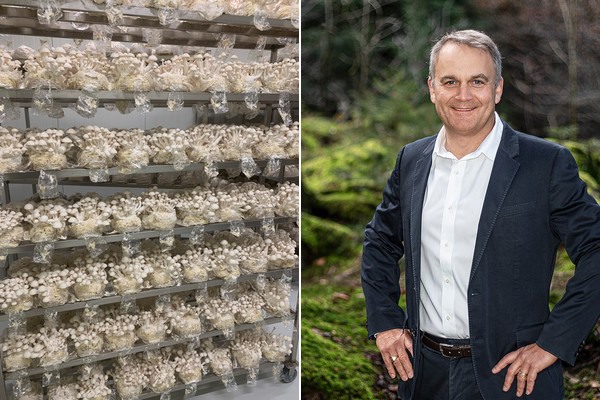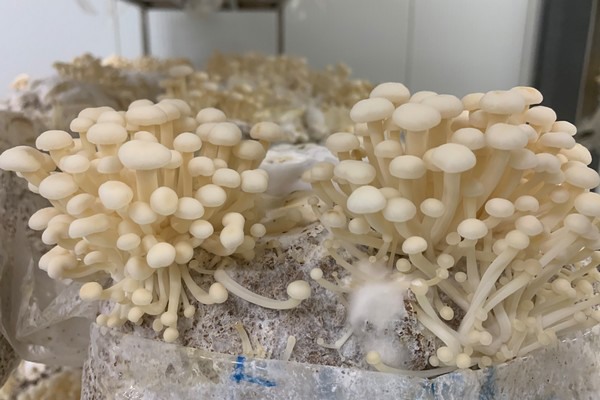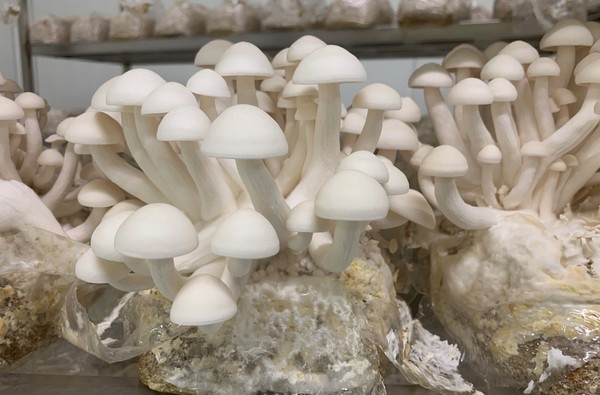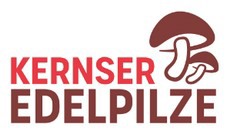Kernser Edelpilze GmbH has expanded its product range with two new varieties of edible mushrooms. In addition to herb mushrooms, shiitake, oyster mushrooms, nameko and pom pom, the mushroom cultivation company based in Kerns (Central Switzerland) now also produces enoki and shimeji in organic quality. "We have recently received many enquiries from the gastronomy sector as well as the retail trade for the white enoki. Consumers are becoming increasingly aware of these special mushrooms through social media, among other things, and would like to buy them locally and use them in their recipes. Until now, however, this mushroom has been 100 per cent imported from China," reports Christian Fanger, the company's managing director.
 Christian Fanger
Christian Fanger
The same applies to the second new product called Shimeji, which was already cultivated at the old production site in the past. At the current site, shimeji cultivation has never been successful so far, says Fanger looking back. "After some adjustments in substrate production, we have now started a new approach and the first productions show promising quality. Among other things, we also offer the shimeji in our mixed packages for gastronomy - consisting of four to six mushroom varieties. With its colour and shape, the shimeji in this packaging brings some variety. In terms of taste, this mushroom variety is often used in mushroom soups or as an accompaniment to a sauce, especially in the autumn months."
According to Fanger, the cultivation process is similar to that of other fine mushrooms. Only the shimeji requires a somewhat longer ripening period. "It's not so much the free production capacities, but the storage capacities for the longer ripening period that could be a limiting factor in the future."
 Shimeji
Shimeji
Swiss noble mushrooms on the rise
Overall, domestically cultivated mushrooms are on the rise, Fanger continues. According to the figures of the Association of Swiss Mushroom Producers (VSP), the share of domestically cultivated mushrooms has now increased to around 50 per cent. Only organic mushrooms are produced in Switzerland. Although the herb mushroom is still the most popular mushroom, the VSP says there is further market potential with new varieties. "The two pandemic years 2021/22 were the strongest sales years, which is primarily due to the lower purchase tourism and the correspondingly higher domestic sales. In order to be able to further increase the degree of self-sufficiency for sweet mushrooms, more producers are needed who invest in sweet mushroom cultivation or existing cultivation companies who want to expand their capacity. Personally, I am convinced that regionality will also continue to gain in importance for mushrooms, which is why decentralised production with short transport routes is particularly important," says Fanger.
Nevertheless, Swiss mushroom producers are also struggling with the omnipresent cost increases, above all rising wage costs. Some of these additional costs can be passed on to the retail trade and the catering trade. Furthermore, they are increasingly relying on the automation of production processes. Fanger: "We have automated our substrate production to a great extent in recent years. I think further automation of harvesting and commissioning is difficult, because many factors have to be decided individually. There are further developments in artificial intelligence. In my opinion, one should also be open and flexible to this trend. Today, however, the two activities are still 100 per cent manual labour."
 Enoki
Enoki
Meat substitutes and marketing concepts
The trend towards less meat will continue in Switzerland as well, he said, with edible mushrooms potentially establishing themselves as a vegan product. "However, they are not yet being promoted as such, i.e. the mushrooms are not yet in the position that they would be a meat alternative. However, they could possibly replace the meat content in certain products in the future and thus improve the CO2 balance of many products. In the end, however, it is the price that decides on further development."
This makes it all the more important to make the consumer aware of the variety of uses of the fine mushrooms. "Unfortunately, many farms lack the resources to organise tastings in the retail trade. However, we at Kernser Edelpilze present ourselves at events and exhibitions where we prepare our products on site and exchange ideas with potential consumers. This can only make a difference on a small scale, but if every producer draws attention to themselves and their healthy products, this could ultimately contribute to increased sales," concludes Fanger.
Further information:
Christian Fanger
Kernser Edelpilze GmbH
Stanserstrasse 50
6064 Kerns
T: +41 41 660 49 49
info@kernser-edelpilze.ch
www.kernser-edelpilze.ch
